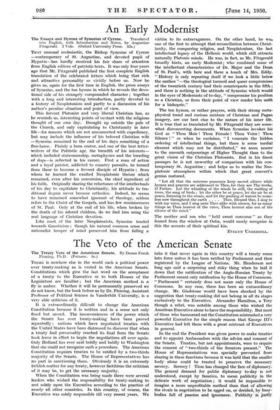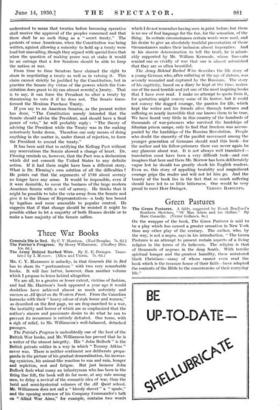The Veto of the American Senate
The Treaty Veto of the American Senate. By Denna Frank Fleming, Ph.D. (Putnam. 9s.) THERE is nowhere else in the world such a political power over treaty-making as is vested in the American Senate. Constitutions which give the last word on the acceptance of a treaty to the Executive or to both Houses of the Legislature are familiar ; but the American. method is a fly in amber. Whether it will be permanently preserved we do not know, but the book before us by Dr. Fleming, Assistant Professor of Political Science in Vanderbilt University, is a very able criticism of it.
It is extraordinarily difficult to change the American Constitution because it is written and in a sense not only fixed but sacred. The inconveniences of the power which the Senate has over treaty-making have been proved repeatedly ; nations which have negotiated treaties with the United States have been distressed to discover that when a treaty had presumably reached its final form the Senate took leave in effect to begin the negotiations all over again. Only Holland has ever said boldly and baldly to Washington that she could not recognize such a procedure. The American Constitution requires treaties to be ratified by a two-thirds majority of the Senate. The House of Representatives has no part in sanctioning them. Obviously it is an extremely ticklish matter for any treaty, however factitious the criticism of it may be, to get the necessary majority.
When the Constitution was being made there were several leaders who wished the responsibility for treaty-making to rest solely upon the Executive according to the practice of nearly all other countries, In this country, of course, the Executive was solely responsible till very recent years. We take it that never again in this country will a treaty come into force unless it has been ratified by Parliament and then registered by the League of Nations. Mr. Henderson not long ago said a surprising and risky thing when he laid it down that the ratification of the Anglo-Russian Treaty by Parliament meant only ratification by the House of Commons. " Parliament " certainly does not mean only the House of Commons. In any case, there has been an extraordinary change. Mr. Gladstone would have been shocked by the suggestion that treaty-making did not belong in all its stages exclusively to the Executive. Alexander Hamilton, a Tory though a rebel, was notable among those who wished the American Executive alone to have the responsibility. But most of those who hammered out the Constitution mistrusted a very powerful Executive for the simple reason that !George III's Executive had left them with a great mistrust of Executives in general.
In the end the President was given power to make treaties and to appoint Ambassadors with the advice and consent of the Senate. Treaties, but not appointments, were to require the consent of " two-thirds of the Senators present." The House of Representatives was specially prevented from sharing in these functions because it was held that the smaller body alone could be trusted to preserve the necessary secrecy. Secrecy ! Time has changed the face of diplomacy. The general demand for public diplomacy to-day is not understood, except by fanatics, to mean publicity in the delicate work of negotiation ; it would be impossible to imagine a more unprofitable method than that of allowing the rivals in negotiation to be egged on, or derided, by busy- bodies full of passion and ignorance. Publicity is justly
understood to mean that treaties before becoming operative shall receive the approval of the peoples concerned and that there shall be no such thing as a " secret treaty." The protests of some Americans, when the Constitution was being written, against allowing a minority to hold up a treaty were loud but unavailing, though they argued with special force that when the question of making peace was at stake it would be an outrage that a few Senators should be able to keep the nation at war.
From time to time Senators have claimed the right to share in negotiating a treaty as well as in vetoing it. This claim cannot strictly be justified by the Constitution, but in practice the Senate (by virtue of the powers which the Con- stitution does grant to it) can almost rewrite: a treaty. That is to say, it can force the President to alter a treaty by threatening to veto it if he does not. The Senate trans- formed the Mexican Purchase Treaty.
If you say to an American Senator, as the present writer has done, " The Constitution merely intended that the Senate should advise the President, and should have a final power of veto," he will probably reply : " The theory of advising the President while the Treaty was in the making notoriously broke down. Therefore our only means of doing anything in the matter is, under threat of rejection, to force the President to amend the treaty."
It has been said that in ratifying the Kellogg Pact without any reservations the Senate showed a change of heart. Dr. Fleming reminds us, however, that the Pact was a declaration which did not commit the United States to any definite action. If it had there might have been a different story. What is Dr. Fleming's own solution of all the difficulties ? He points out that the arguments of 1789 about secrecy no longer have any sense. It would be impossible, even if it were desirable, to cover the business of the large modern American Senate with a veil of secrecy. He thinks that it might be possible to take the veto away from the Senate and give it to the House of Representatives—a body less bound by legalism and more amenable to popular control. He suggests that if that change should be resisted it might be possible either to let a majority of both Houses decide or to make a bare majority of the Senate suffice.



































 Previous page
Previous page